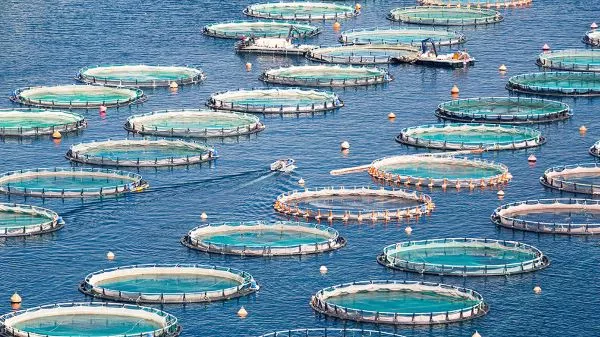The United Arab Emirates (UAE) has been making significant strides in sustainable aquaculture to meet the growing demand for seafood while conserving marine ecosystems. As a country with a rich coastal heritage, the UAE has turned to fish farming as a viable solution to address overfishing and seafood imports. This article highlights some of the top fish farms in the UAE, showcasing their contributions to sustainable aquaculture and food security.
1. Fish Farm LLC
Fish Farms in the UAE is one of the leading aquaculture companies in the UAE, dedicated to producing high-quality seafood using sustainable methods. Established in 2013, the farm operates in three key locations: offshore cages, a hatchery in Umm Al Quwain, and a land-based recirculating aquaculture system (RAS) facility in Jebel Ali.
Key Highlights:
- Uses RAS technology to minimize water waste
- Produces species such as seabream, seabass, and hammour
- Reduces reliance on seafood imports by supplying fresh local fish
Fish Farm LLC’s commitment to sustainability includes using eco-friendly feeds and ensuring responsible farming practices. Their innovative approach helps reduce the carbon footprint associated with seafood imports.
2. Emirates National Fish Farming (Asmak)
Emirates National Fish Farming, also known as Asmak, is another major player in the UAE’s aquaculture industry. It was founded with the vision of enhancing food security and promoting sustainable fish farming in the region.
Key Highlights:
- Specializes in high-value fish species like barramundi, seabass, and shrimp
- Operates state-of-the-art hatcheries and farms
- Implements stringent biosecurity measures to ensure healthy fish production
Asmak’s vertically integrated supply chain enables full control over the production process, from hatchery operations to distribution. This ensures that consumers receive high-quality, responsibly farmed seafood.
3. Al Jaraf Fisheries
Al Jaraf Fisheries is one of the oldest and most reputable fish farming companies in the UAE. It has played a crucial role in boosting the country’s aquaculture sector by investing in modern fish farming techniques.
Key Highlights:
- Focuses on sustainable marine fish farming
- Utilizes advanced aquaculture technologies
- Contributes to local seafood supply and exports
Al Jaraf Fisheries has been instrumental in reducing overfishing in UAE waters by providing an alternative source of seafood through sustainable fish farming initiatives.
4. The Sheikh Khalifa Marine Research Center
This state-of-the-art aquaculture research facility is a significant initiative in the UAE’s drive for sustainable fish farming. Established by the Abu Dhabi government, the center conducts research to develop best practices in aquaculture and improve fish breeding programs.
Key Highlights:
- Engages in research on breeding and hatchery techniques
- Supports the UAE’s food security strategy
- Promotes conservation of marine biodiversity
The center has been actively involved in projects aimed at increasing the production of native fish species such as hammour, which is highly sought after in the UAE market.
5. Dibba Bay Oysters
Although primarily focused on oyster farming, Dibba Bay is an excellent example of sustainable aquaculture in the UAE. Situated along the coast of Fujairah, Dibba Bay specializes in premium-quality oysters that are highly regarded in international markets.
Key Highlights:
- First shellfish farm in the Middle East
- Uses clean, nutrient-rich waters of the Gulf of Oman
- Supplies top-tier restaurants in the UAE and beyond
Dibba Bay’s sustainable approach to shellfish farming aligns with global efforts to promote eco-friendly aquaculture and marine conservation.
6. International Fish Farming Company (IFFCO)
IFFCO has played a significant role in the UAE’s aquaculture sector by introducing advanced fish farming techniques and supporting sustainable seafood production.
Key Highlights:
- Implements high-tech aquaculture systems
- Engages in breeding programs for multiple fish species
- Committed to environmental sustainability and food security
IFFCO’s efforts have been instrumental in reducing the dependency on imported seafood while ensuring high-quality, locally produced fish reach the market.
Sustainable Aquaculture Practices in the UAE
The UAE government and private sector have been actively promoting sustainable aquaculture through several key initiatives:
- Investment in Recirculating Aquaculture Systems (RAS): Many farms, such as Fish Farm LLC, use RAS to recycle water, significantly reducing water consumption and environmental impact.
- Breeding Indigenous Species: Farms focus on breeding native fish species to avoid disrupting the local ecosystem.
- Reducing Dependency on Wild Catches: Sustainable fish farming helps alleviate pressure on wild fish populations, preserving marine biodiversity.
- Advanced Biosecurity Measures: Farms implement stringent health and hygiene protocols to prevent disease outbreaks and ensure fish welfare.
- Government Support and Research: The UAE government funds research initiatives and policy frameworks to develop best practices in aquaculture.
Conclusion
Sustainable fish farming is a vital component of the UAE’s food security and environmental conservation efforts. With farms like Fish Farm LLC, Asmak, and Dibba Bay leading the way, the country is positioning itself as a global hub for responsible aquaculture. By embracing innovative techniques and eco-friendly practices, these farms not only provide fresh, high-quality seafood but also contribute to marine sustainability and economic growth.









